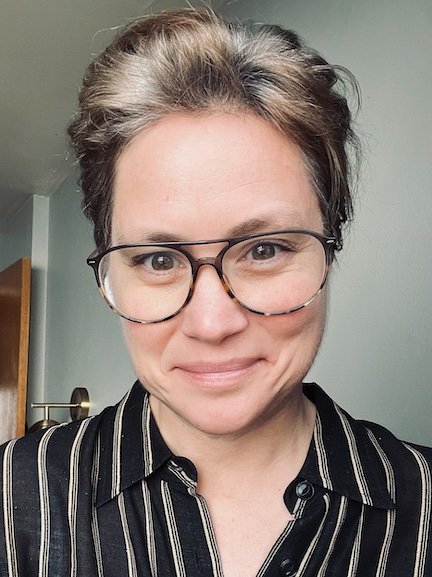
About Carina
It was in graduate school that I learned what had been the missing link to my work up to that point: recovering the relationship to food is part of recovering the relationship to self. When we do this work, it sends a signal to the body that says, “I care about you,” and we begin to experience freedom in ourselves, and in our lives.
A creative journey to counseling
My journey to the field of counseling was not direct. I spent many years working in the restaurant industry and later in early childhood education. They were two different worlds, but the common thread was service and connecting with people.
I am a mental health counselor with a culinary background. I orient towards cooking and nutrition to support mental health and I am passionate about food and cooking. I have been cooking for all of my adult life, but becoming food-centered began back in 2007 when I attended the Seattle Culinary Academy for Bread and Pastries. I developed an interest in the art of slow food and being intentional about procuring and preparing food. I then completed my undergraduate studies in liberal arts, with a concentration in psychology and community. It was then I knew I wanted to help people repair their relationships to food. I knew there were a lot of reasons people were disconnected from their selves and those reasons could be very complicated. This knowing moved me towards pursuing a master’s in counseling. I needed to know more.
During my graduate work, I began to plant the seeds for centering an attachment-based approach. It included conceptualizing the process around recovering the relationship to self. Experiences like multigenerational trauma and emotional neglect, imperfect humans raising imperfect humans, masking neurodivergence, and collective systemic harms all contribute to a separation from self.
A Personal Journey
Throughout these years, I was engaged in the process of recovering my relationship to self. We never get anywhere alone, and I, too, had help along the way. Over time I made connections with my body that were tied to my relationship with food.
One morning I realized the nourishing act I was engaged in when fried an egg for myself on a Sunday morning. As I stood over the stove and tended to the egg, I recognized the connection with my body and the care and nourishment the egg was about to provide.
One evening, after a long day on campus I was exhausted, and I thought about ordering takeout. That in itself could have been a perfectly acceptable form of self-care. But then I remembered the fresh food I had in my refrigerator that I had planned for the evening. As I approached my door, I pepped myself up to cook. I set my belongings down, and I retreated into the kitchen. As I was completing my meal it occurred to me how much energy I felt in my body. I felt restored and recalibrated. It was an odd realization to acknowledge that shift, but it also very much aligned with my theory, so I was grateful for the data.
“I walk in and out of several worlds each day.”
- Joy Harjo
Repair and Recovery
Like many people who live in the U.S. I was a target of diet culture. I bought into the stories about carbohydrates being bad. It took a long time for me to recover from the particular wound, but two things helped me: I bought a rice cooker, and I started baking bread again. There is something magical about working with dough. It has an alive quality, and it can be very grounding. It has the capacity to pull you back into the present, into the body.
I know I could not have realized the connection about food and body being a significant part of recovery without having gone through that process myself. That said, everyone’s journey is different. Your journey will look much different than my own.
I graduated with a Master of Arts in Counseling from Antioch University and have been working as a mental health counseling in private practice since 2021.
When I am not working with clients, I enjoy reading about food via cookbooks, food blogs, and magazines or planning and executing my next food project. I also like to swim, garden, and take long walks in the city and in the parks and forests that surround Seattle.
I believe that our work in this life is not only personal, but collective. I believe in being engaged in our democracy in an active capacity. I volunteer for several activist organizations and encourage people to vote on human rights issues that impact our everyday lives.

